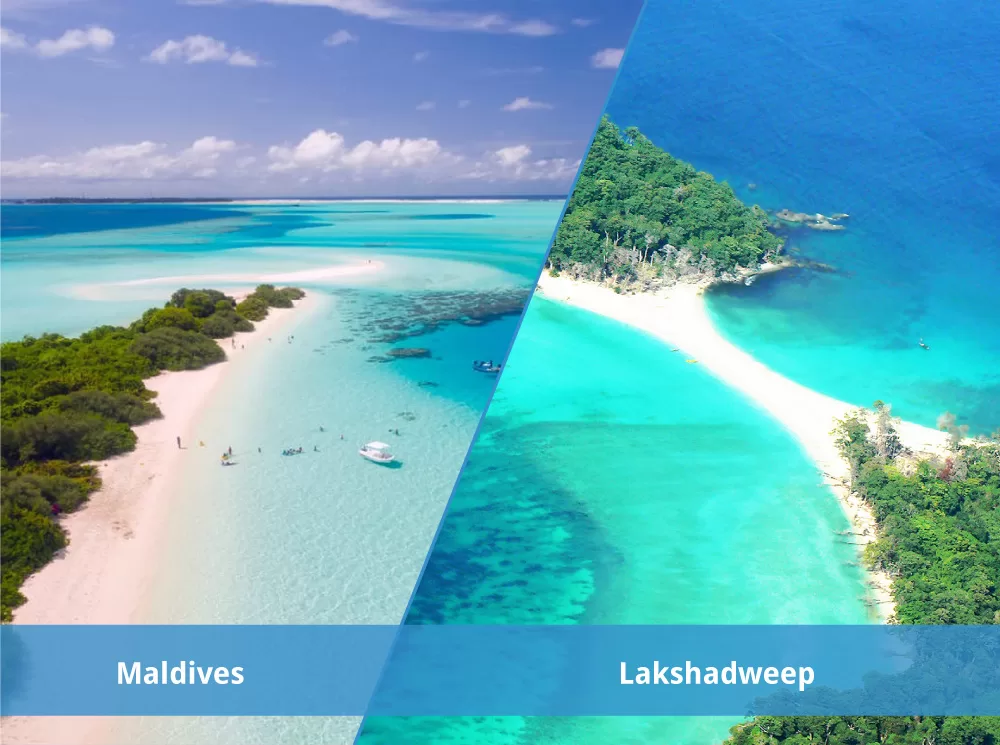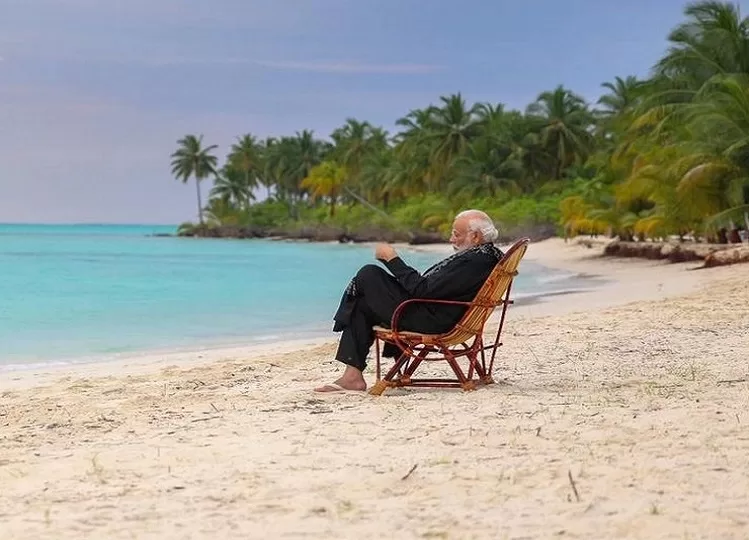Under the crystalline waters of Lakshadweep lies a story of political conflict and ecological peril. Narendra Modi’s latest visit to this blissful archipelago not only causes a diplomatic crisis with Maldives but also reminds us of the poor state of the Lakshadweep ecosystem.

The Social Media Storm: Lakshadweep vs. Maldives
The result of Prime Minister Modi’s efforts to demonstrate Lakshadweep’s beauty in the era of digital diplomacy was an unexpected social media war. As people began discriminating in favour of Lakshadweep compared to the Maldives, cries for a boycott emerged. In a fiery rejoinder, Maldivian politicians criticized Modi and Lakshadweep which led to approaches for temporary suspensions of business linkages in retaliation. The controversy not only added to the tension but also caused Lakshadweep’s online popularity to skyrocket.

Diplomatic Ripples: The Maldives and India’s Response
When diplomatic relations between the Maldives and India were disrupted, political discord reached new heights. Although the Maldivian government disassociated itself from such comments, India pursued diplomatic initiatives like suspending flights to the Maldives and providing discounts for Lakshadweep. The controversy went a step further with endorsements of Lakshadweep from Indian actors and cricketers while the business ties between Maldives were suspended by traders’ groups. The official position of the Indian government regarding these diplomatic consequences remains unclear.
Maldives’ Existential Crisis: Climate Change and Environmental Challenges
The Maldives are in the midst of an existential crisis brought about by climate change against a backdrop of political chaos. This idyllic archipelago is facing the dangers of increasing sea levels, coral bleaching, extreme weather events and environmental degradation. Consolidated efforts worldwide are necessary to protect the Maldivian unique environment and its people. Despite these obstacles, the Maldives has led climate action globally with far-reaching targets for emissions and renewable energy uptake.
Lakshadweep’s Lament: A Symphony of Ecological Peril
Amid the delicate arms of Lakshadweep’s azure waters, lies an enlarging pattern of ecological degradation. However, now the reef ecosystem struggles with an endless battle as it faces diversity reduction and degradation through simplification of the structure while also suffering from the danger imposed by sea level rise. Lakshadweep then represents a haunting figurehead of climate hazards, fighting the tides rising in an uncertain futures

Charting a Sustainable Course: Lakshadweep’s Unique Identity
Amid political storms and environmental challenges, Lakshadweep finds itself at a juncture. Different from the Maldives, the charisma of Lakshadweep lies in its unspoiled and natural splendour. The archipelago could not only learn from the mistakes made by the Maldives and have a more considered approach to tourism.
Diversifying the Economy: A Path Less Taken
Unlike the Maldives which is highly dependent on tourism, Lakshadweep has an opportunity to diversify its economy. Sustainable fishing practices, eco-friendly initiatives and its strong cultural heritage can help to build a robust economic model for Lakshadweep. This strategy guarantees that the charm of its white sandy beaches and bountiful marine life remains through generations.
Sustainable Growth: Balancing Development and Conservation
With proper regulations and implemented urban planning, Lakshadweep can avoid the harm that may result from rash development. Sustainable development can also be achieved by preserving the local architecture, and traditional practices and keeping the ecological footprint of such infrastructure projects minimal. It is possible that while maintaining environmental conservation, Lakshadweep’s identity can be protected.
Proactive Climate Change Measures: Learning from the Maldives’ Vulnerabilities
It has been open to Lakshadweep the possibility of adopting climate change adaptation initiatives in advance as it learns from such vulnerabilities facing Maldives. However, the low-lying islands are faced with a great risk of climate change and Lakshadweep could adopt measures to reduce those risks for its long-term sustainability.
It is amidst political controversies and diplomatic strains that Lakshadweep’s ecological crisis demands sustainable practices, well-informed policies, and alliances. The dynamics between politics and the environment in Lakshadweep serve as a message that what happens with those azure waters not only matters for the region but also for all of us. With the archipelago sailing through choppy waters, choices made today will resonate in time waves shaping the destiny of Lakshadweep and more.









